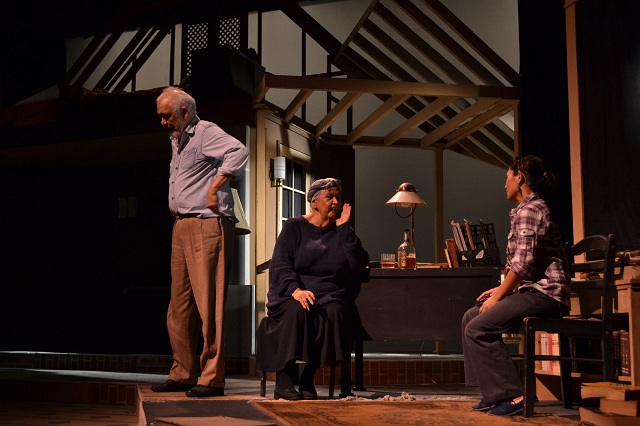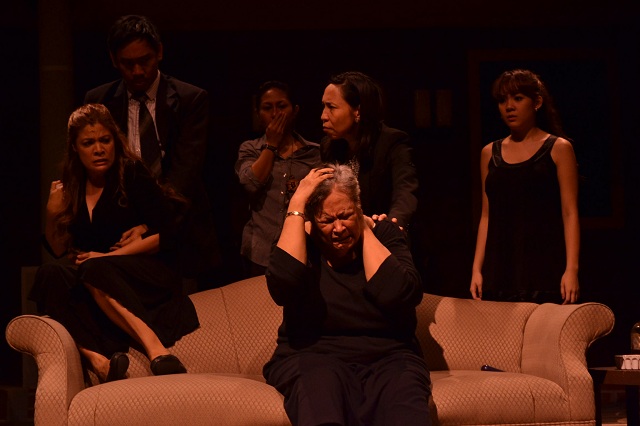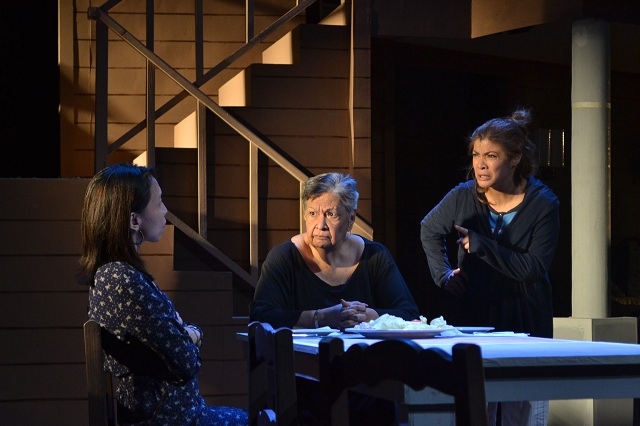Filtered by: Lifestyle
Lifestyle
Theater review: The Rep’s majestic ‘August: Osage County’
By IBARRA C. MATEO

The cast of 'August: Osage County'. Photos courtesy of Repertory Philippines
Chris Millado’s directorial debut with Repertory Philippines, the three-and-a-half-hour production of Tracy Letts' Pulitzer Prize-winning “August: Osage County,” tackled enough major psychiatric disorders to fill a medical encyclopedia.
In the opening scene alone, the patriarch Beverly Weston (Leo Rialp) declares to the calm young woman he has hired to look after his wife Violet: “My wife takes pills, and I drink. That’s the bargain we’ve struck.”
As the play progresses, adultery, pot-smoking, depression, paranoia, and sexual misbehavior color the landscape of the Weston household in Oklahoma.
Beastly guilt, spawned by secrets family members spanning three generations have been keeping from one another, has caused all these pathos. Audiences may even glimpse their own families’ fears in “August.”
Millado said Letts' powerful script, which also won a Tony Award for Best Play in 2008, “sharply etched both the characters and situations.”
The tang and tart of local telenovelas, situation comedies, and soap operas are mixed in “August” and are among the factors why the Filipino audience will not feel the ticking past of three hours and 30 minutes—though they should eat dinner before the show. They will be entertained intellectually but devastated emotionally by the endless volleys of funny and witty lines spewed by the characters.
A stellar production and cast

In the opening scene alone, the patriarch Beverly Weston (Leo Rialp) declares to the calm young woman he has hired to look after his wife Violet: “My wife takes pills, and I drink. That’s the bargain we’ve struck.”
As the play progresses, adultery, pot-smoking, depression, paranoia, and sexual misbehavior color the landscape of the Weston household in Oklahoma.
Beastly guilt, spawned by secrets family members spanning three generations have been keeping from one another, has caused all these pathos. Audiences may even glimpse their own families’ fears in “August.”
Millado said Letts' powerful script, which also won a Tony Award for Best Play in 2008, “sharply etched both the characters and situations.”
The tang and tart of local telenovelas, situation comedies, and soap operas are mixed in “August” and are among the factors why the Filipino audience will not feel the ticking past of three hours and 30 minutes—though they should eat dinner before the show. They will be entertained intellectually but devastated emotionally by the endless volleys of funny and witty lines spewed by the characters.
A stellar production and cast

Rialp, Barredo and Bayani share a scene.
The staging was alternately ardent, brooding, comical, lacerating, howling, heartrending, and intense, a volcanic eruption coupled with a typhoon. "Majestic" may even seem an understatement to describe the production.
All the cast members, who sensitively deliver the kilometric lines and the ensemble work demanded by the intelligent script, are the jewels of this colossal production, from Baby Barredo as Violet Weston to Arnel Carrion, who appears in a cameo role as Sheriff Deon Gilbeau.
Actor-director Miguel Faustmann designed the handsome but gloomy set which confined the ensemble in a cramped two-storey house with an attic.
Perhaps the three tiers allude to the three Weston daughters, or was Faustmann keenly pointing the audience to the three generations of Westons?
With minimal set changes, the actors amble about, converse, reminisce, plot, uncover secrets, and savagely attack each other verbally in the available spaces of this small set, dominated by lamps, earth colors, and splashed lavishly with shadows crafted masterfully by Katsch Catoy.
Costume designer James Reyes clothes the cast persuasively, designing and assembling costumes for every scene that maximize the persona of each actor.
Reyes took into account the overall texture of each scene, from Violet’s black blouse, skirt in stretch crepes with chiffon sleeves, and champagne pearl necklace to symbolize power as the new head of the family at the Beverly funeral, down to “Little” Charles Aiken’s white socks and light brown leather shoes, hinting simplicity.
Uncovering secrets

All the cast members, who sensitively deliver the kilometric lines and the ensemble work demanded by the intelligent script, are the jewels of this colossal production, from Baby Barredo as Violet Weston to Arnel Carrion, who appears in a cameo role as Sheriff Deon Gilbeau.
Actor-director Miguel Faustmann designed the handsome but gloomy set which confined the ensemble in a cramped two-storey house with an attic.
Perhaps the three tiers allude to the three Weston daughters, or was Faustmann keenly pointing the audience to the three generations of Westons?
With minimal set changes, the actors amble about, converse, reminisce, plot, uncover secrets, and savagely attack each other verbally in the available spaces of this small set, dominated by lamps, earth colors, and splashed lavishly with shadows crafted masterfully by Katsch Catoy.
Costume designer James Reyes clothes the cast persuasively, designing and assembling costumes for every scene that maximize the persona of each actor.
Reyes took into account the overall texture of each scene, from Violet’s black blouse, skirt in stretch crepes with chiffon sleeves, and champagne pearl necklace to symbolize power as the new head of the family at the Beverly funeral, down to “Little” Charles Aiken’s white socks and light brown leather shoes, hinting simplicity.
Uncovering secrets

Barredo delivers as the Weston family's matriarch and Medusa.
The drama slowly unfolds with a quiet scene where patriarch Beverly interviews Johnna Monevata, a 26-year-old Cheyenne woman whom he hires as a live-in helper to look after his wife Violet. His wife is afflicted with cancer of the mouth, and a lot more.
Beverly suggests to Johnna to read T.S. Eliot, lending her a book and even quoting one of Eliot's lines: “Life is very long.”
Rialp's brief but imposing presence as the patriarch-academician-poet weighed down by guilt and sorrows is notable for its humor and wretchedness.
Angeli Bayani as Johnna is lovable as the hushed but tough omnipresence in the Weston house, barely speaking but constantly gliding in and out of the scenes, at peace with herself in the attic as the Weston family self-destructs, but ready with her frying pan to attack evil-doers.
Beverly's sudden disappearance sets the stage for the arrival and grand assembly of the Weston couple’s three daughters and their husbands or partners.
And as the Westons divine the reason for Beverly's actions, the family soul-searching begins, leading to painful reminiscing about their dark, sinful past.
Inevitably, the torpedoes of anger and warheads of bile are launched, emotionally injuring all the family members. The gathering meant to comfort and support the matriarch Violet becomes instead a psychological Viking massacre, emotional carnage.
Baby Barredo as the offensive and ill Violet Weston, addicted to prescription drugs and and narcotics, delivers as the Medusa of all Medusas in “August” and all the recent local theater productions combined.
Violet psychologically assassinates her family members, eloquently unleashing a tidal wave of family secrets for her own selfish motives. Barredo is the beast of all the beasts in the Weston family house, which metamorphoses into a gladiator’s arena where no one escapes alive.

Beverly suggests to Johnna to read T.S. Eliot, lending her a book and even quoting one of Eliot's lines: “Life is very long.”
Rialp's brief but imposing presence as the patriarch-academician-poet weighed down by guilt and sorrows is notable for its humor and wretchedness.
Angeli Bayani as Johnna is lovable as the hushed but tough omnipresence in the Weston house, barely speaking but constantly gliding in and out of the scenes, at peace with herself in the attic as the Weston family self-destructs, but ready with her frying pan to attack evil-doers.
Beverly's sudden disappearance sets the stage for the arrival and grand assembly of the Weston couple’s three daughters and their husbands or partners.
And as the Westons divine the reason for Beverly's actions, the family soul-searching begins, leading to painful reminiscing about their dark, sinful past.
Inevitably, the torpedoes of anger and warheads of bile are launched, emotionally injuring all the family members. The gathering meant to comfort and support the matriarch Violet becomes instead a psychological Viking massacre, emotional carnage.
Baby Barredo as the offensive and ill Violet Weston, addicted to prescription drugs and and narcotics, delivers as the Medusa of all Medusas in “August” and all the recent local theater productions combined.
Violet psychologically assassinates her family members, eloquently unleashing a tidal wave of family secrets for her own selfish motives. Barredo is the beast of all the beasts in the Weston family house, which metamorphoses into a gladiator’s arena where no one escapes alive.

Barbara (Amador, right) with Violet (Barredo) and Ivy (Monsod).
Pinky Amador as Barbara Fordham—the eldest daughter of Beverly and Violet, also mother of Jean and wife of Bill—matches Barredo’s barbaric intensity and coarseness as a control-freak wife unable to stop the liquefaction of her marriage and the dissolution of ties with her daughter Jean.
In one scene where Barbara physically subdues Violet to the floor to confiscate a pill bottle from the matriarch’s hands, Amador shouts: “I am running things now.” Unintentionally and grimly, Barbara transforms herself into the persona of her mother Violet, becoming the person she hates. Mother and daughter are now equal, possessing the brutality of a Caterpillar bulldozer in pulverizing people around them, sparing no one.
Tami Monsod as Ivy, the second Weston daughter—a teacher who regularly drops by to check on her parents—is initially presented as a calm and composed woman with no love life.
Slowly, Monsod persuasively unveils her other self by courageously belying misconceptions about her and exposing her innermost secret.
Then there is the daughters' cousin “Little” Charles Aiken, the unemployed and clumsy son of Violet's sister Mattie Fae and convincingly essayed by Noel Rayos.
Liesl Batucan as Karen Weston, the newly engaged youngest daughter, is acutely heart-breaking as she chooses to escape from the family lies and from her own unhappiness by endlessly and senselessly rambling about her plans. Hans Eckstein plays Karen's fiance Steve, a businessman with murky origins.
The other members of the cast must be emphatically praised for their individual roles and contributions in making “August” a sterling theatrical experience: Kenneth Moraleda as Bill Fordham, Sheila Francisco as the vicious Mattie Fae Aiken (Francisco is also the understudy for the role of Violet), Thea Gloria as Jean Fordham, and Richard Cunanan as Charlie Aiken, who brings the house down in the scene where he bumbles in saying the Thanksgiving prayer.
All together, the performers in “August” mark their roles with elegiac lilt yet retain the original beauty of Letts’ script. So poetically tragic is the production that by its end, one is redeemed. — BM, GMA News
"August: Osage County" runs until March 16, 2014 at Onstage, Greenbelt 1, Makati City. There will be shows on Fridays and Saturdays at 8:00 p.m. and matinee shows on Saturdays and Sundays at 3:30 p.m.
For inquiries, call 571-6926 or 571-4941, email shows@repertoryphilippines.com or visit http://www.repertoryphilippines.com.
A journalist since 1983, Ibarra C. Mateo has worked as an international wire correspondent based in Tokyo covering Asian politics. He returned to Manila after studying Japanese history and Japanese urban sociology at the Sophia University Graduate School. Mateo has no relevant affiliations with any company or organization that would benefit from this review. The views expressed in this article are the author's own.
In one scene where Barbara physically subdues Violet to the floor to confiscate a pill bottle from the matriarch’s hands, Amador shouts: “I am running things now.” Unintentionally and grimly, Barbara transforms herself into the persona of her mother Violet, becoming the person she hates. Mother and daughter are now equal, possessing the brutality of a Caterpillar bulldozer in pulverizing people around them, sparing no one.
Tami Monsod as Ivy, the second Weston daughter—a teacher who regularly drops by to check on her parents—is initially presented as a calm and composed woman with no love life.
Slowly, Monsod persuasively unveils her other self by courageously belying misconceptions about her and exposing her innermost secret.
Then there is the daughters' cousin “Little” Charles Aiken, the unemployed and clumsy son of Violet's sister Mattie Fae and convincingly essayed by Noel Rayos.
Liesl Batucan as Karen Weston, the newly engaged youngest daughter, is acutely heart-breaking as she chooses to escape from the family lies and from her own unhappiness by endlessly and senselessly rambling about her plans. Hans Eckstein plays Karen's fiance Steve, a businessman with murky origins.
The other members of the cast must be emphatically praised for their individual roles and contributions in making “August” a sterling theatrical experience: Kenneth Moraleda as Bill Fordham, Sheila Francisco as the vicious Mattie Fae Aiken (Francisco is also the understudy for the role of Violet), Thea Gloria as Jean Fordham, and Richard Cunanan as Charlie Aiken, who brings the house down in the scene where he bumbles in saying the Thanksgiving prayer.
All together, the performers in “August” mark their roles with elegiac lilt yet retain the original beauty of Letts’ script. So poetically tragic is the production that by its end, one is redeemed. — BM, GMA News
"August: Osage County" runs until March 16, 2014 at Onstage, Greenbelt 1, Makati City. There will be shows on Fridays and Saturdays at 8:00 p.m. and matinee shows on Saturdays and Sundays at 3:30 p.m.
For inquiries, call 571-6926 or 571-4941, email shows@repertoryphilippines.com or visit http://www.repertoryphilippines.com.
A journalist since 1983, Ibarra C. Mateo has worked as an international wire correspondent based in Tokyo covering Asian politics. He returned to Manila after studying Japanese history and Japanese urban sociology at the Sophia University Graduate School. Mateo has no relevant affiliations with any company or organization that would benefit from this review. The views expressed in this article are the author's own.
More Videos
Most Popular




